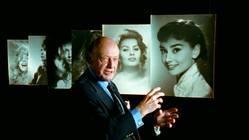Dir-prod: Craig McCall. UK. 2010. 86mins

The affectionate and fascinating documentary Cameraman: The Life & Works of Jack Cardiff, which screens in the Cannes Classics section of the Cannes International Film Festival, is so engaging and watchable that its modest running time actually leaves you wanting more. It is an entertaining look at one of the world’s greatest cinematographers with a plethora of film clips and interviews and should prove a popular draw for film fans and programmers alike.
The documentary has a real sense of real insight and gravitas.
The life and career of Cardiff- who died in April 2009 – is intertwined with the history of cinema. Born in 1914, he worked as a child actor on a number of silent films between 1918 and 1928, and then graduated from clapper boy and on to camera operator, working on films such as Knight Without Armour (1937), starring Marlene Dietrich.
After working as camera operator on Powell and Pressburger’s 1943 film The Life and Death of Colonel Blimp, he was asked by director Michael Powell to act as cinematographer on A Matter of Life and Death (1946), which secured his reputation as a master of using Technicolor cinematography. He won his first Oscar for cinematography on Black Narcissus (1947), and went on to work on a series of classic Technicolor films such as The Red Shoes, Pandora and the Flying Dutchman, Legend of the Lost, War and Peace, The Prince and the Showgirl and The Vikings.
Producer-director Craig McCall has clearly been working on the film for many years as the film contains footage with him and Cardiff shot over an extensive period, plus features interviews with the likes of Charlton Heston, John Mills, Moira Shearer and Kim Hunter, many of whom died some years ago. But these interviewees – combined with testimonies from Martin Scorsese (a long-time Cardiff fan), Kirk Douglas, Lauren Bacall and Thelma Schoonmaker – help give the documentary a real sense of real insight and gravitas.
Jack Cardiff himself always comes across as a modest and affable figure, at home with both the technical and artistic side of cinematography, a fact recognised when he was the first cinematographer to receive an Honorary Oscar in 2001, some 54 years after his Black Narcissus Oscar win. He states that he was just as happy working with Powell and Pressburger as with Sylvester Stallone (he shot Rambo: First Blood Part II for director George P. Cosmatos in 1985), but is more at ease talking about how he filmed actresses such as Marlene Dietrich, Sophia Loren, Ava Gardner, Marilyn Monroe and Audrey Hepburn.
The film touches on his work as a director, with special emphasis on his black-and-white film Sons and Lovers (1960), but skirts over later work on more exploitation fare, such as Girl on a Motorcycle and The Mercenaries (both 1968) and The Mutations (1974). There is also no footage from his aborted 1953 film William Tell, starring and funded by Errol Flynn, despite material (without sound admittedly) existing.
The film is released theatrically in the UK to tie in with a film retrospective of Jack Cardiff’s work at the National Film Theatre screening throughout May.
Production companies: Modus Operandi Films, UK Film Council, Smoke & Mirrors
International sales: High Point Media Group, www.highpointfilms.co.uk
Executive producers: Mason Cardiff, Lenny Crooks, Chris Roff, Julie Williams
Co-producer: Richard McGill
Cinematography: James Welland. Bob Williams, Steven Chivers, Ricardo Coll, Simon Fanthorpe, Nicholas Hoffman, Jonathan Rho, Ian Salvage, John Walker
Editor: Dan Roberts
Music: Mark Sayer-Wade
Website: www.jackcardiff.com






![The Brightest SunScreen[Courtesy HKIFF]](https://d1nslcd7m2225b.cloudfront.net/Pictures/274x183/3/5/0/1448350_thebrightestsunscreencourtesyhkiff_312678.jpg)














